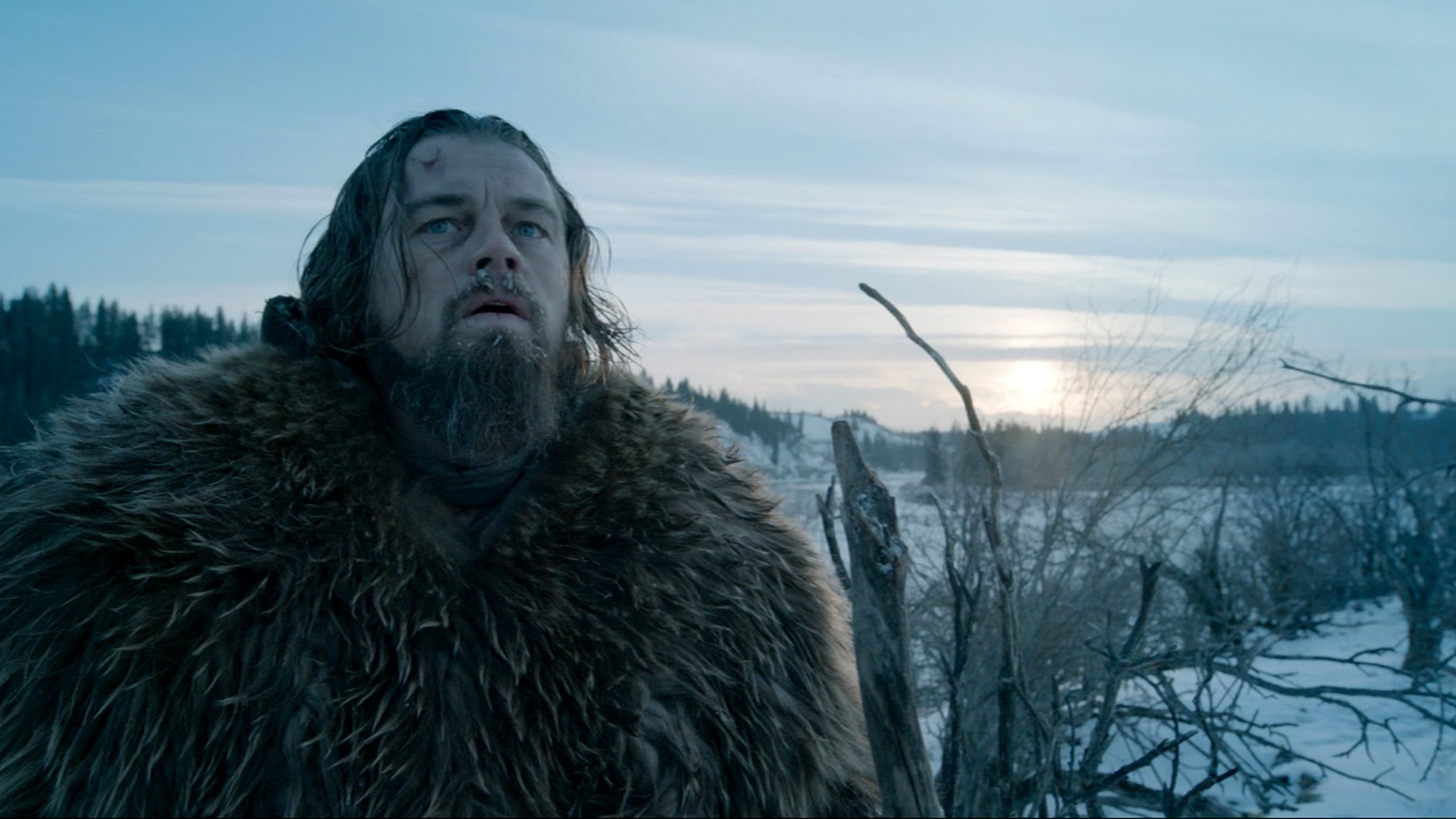The Revenant, directed by Alejandro González Iñárritu, is a film that captivates audiences with its raw portrayal of survival and vengeance in the unforgiving wilderness of 19th-century America. This critically acclaimed movie stars Leonardo DiCaprio as Hugh Glass, a frontiersman whose harrowing journey through the wilds of North America has become a symbol of resilience and determination. The film is not just an adventure—it's an immersive experience that leaves viewers questioning the limits of human endurance. With stunning cinematography and a powerful narrative, The Revenant has earned its place in cinematic history, resonating deeply with audiences worldwide.
From the breathtaking landscapes of Canada and Montana to the brutal realities of frontier life, The Revenant offers a gritty and unflinching look at the challenges faced by early explorers. The film explores themes of betrayal, revenge, and redemption, all set against the backdrop of a harsh and unforgiving natural world. It’s a story that challenges viewers to consider the lengths they would go to survive—and whether vengeance is worth the cost. This cinematic masterpiece has captivated audiences worldwide, earning numerous awards and critical acclaim.
What makes The Revenant truly remarkable is its commitment to authenticity. Filmed in natural light with minimal CGI, the movie provides an unfiltered glimpse into the brutal realities of life in the 1820s. The performances are intense, the dialogue sparse, and the action sequences breathtaking. It’s a film that demands attention, rewarding those who immerse themselves in its world with a deeper understanding of the human spirit. As you dive into this article, you’ll discover the fascinating backstory behind the film, its production challenges, and the cultural impact it continues to have.
Read also:Bryan Adams Wife And Kids The Untold Story Of Family Life
Who Was Hugh Glass, the Real-Life Inspiration for The Revenant?
Before delving into the cinematic adaptation, it's essential to understand the real-life figure behind The Revenant. Hugh Glass was a legendary frontiersman whose incredible story of survival has been passed down through generations. Born in Pennsylvania in the early 1800s, Glass was a fur trapper and explorer who found himself in the midst of a life-or-death struggle after a grizzly bear attack. His journey through the wilderness, alone and severely injured, has become the stuff of legend.
To better understand Hugh Glass, here’s a brief overview of his life:
- Name: Hugh Glass
- Birth: Early 1800s, Pennsylvania
- Occupation: Fur trapper, frontiersman
- Notable Event: Survived a grizzly bear attack and traveled 200 miles for help
While the film takes creative liberties with his story, the core elements of Glass’s ordeal remain true to history. His resilience and determination in the face of overwhelming odds have inspired countless tales, including the iconic film The Revenant.
What Makes The Revenant Stand Out Among Survival Films?
The Revenant is more than just another survival film; it’s a deeply emotional and visually stunning exploration of the human condition. Unlike many other films in the genre, it doesn’t rely on special effects or exaggerated action sequences to captivate its audience. Instead, it uses the raw beauty of nature and the raw emotions of its characters to create an immersive experience. The film’s emphasis on realism sets it apart, making it a must-watch for fans of the genre.
One of the key elements that makes The Revenant unique is its use of natural light. Filmed entirely with natural lighting, the movie captures the harsh beauty of the wilderness in a way that feels authentic and unfiltered. This approach not only enhances the visual experience but also underscores the film’s commitment to realism. The result is a film that feels like a window into another time, allowing viewers to experience the challenges faced by early explorers firsthand.
Why Did The Revenant Win So Many Awards?
The Revenant’s success at award shows was no accident. With 12 Academy Award nominations and three wins, including Best Director for Alejandro González Iñárritu and Best Actor for Leonardo DiCaprio, the film was widely recognized for its excellence in filmmaking. But what exactly made it so deserving of these accolades?
Read also:Tiger Woods Girlfriend Unveiling The Life And Relationship Of The Golf Legend
Firstly, the performances were outstanding. Leonardo DiCaprio delivered one of the most physically demanding roles of his career, earning widespread praise for his portrayal of Hugh Glass. Tom Hardy, who played John Fitzgerald, also gave a memorable performance as the antagonist. The film’s technical achievements were equally impressive, with its cinematography, sound design, and production design all contributing to its success.
How Was The Revenant Filmed in Such Harsh Conditions?
Filming The Revenant was an enormous challenge, both for the cast and crew. The decision to shoot in natural light meant that production was often at the mercy of the weather, leading to long days and unpredictable schedules. The harsh conditions of the wilderness added another layer of difficulty, with freezing temperatures and rugged terrain making every day a battle.
Alejandro González Iñárritu, known for his perfectionism, pushed the boundaries of traditional filmmaking to create a truly immersive experience. The use of natural light, combined with the stunning landscapes of Canada and Montana, resulted in some of the most breathtaking visuals ever captured on film. However, this approach came at a cost, with the production facing numerous setbacks and delays due to the unpredictable nature of the environment.
What Lessons Can We Learn from The Revenant?
Beyond its stunning visuals and powerful performances, The Revenant offers valuable lessons about resilience, forgiveness, and the human spirit. Hugh Glass’s journey through the wilderness is a testament to the strength of the human will, showing that even in the face of insurmountable odds, survival is possible. The film also explores the theme of vengeance, questioning whether the pursuit of revenge is worth the cost.
For those who watch The Revenant, the experience is more than just entertainment—it’s a chance to reflect on the limits of human endurance and the choices we make in the face of adversity. The film challenges viewers to consider what truly matters in life and whether the pursuit of justice is worth the sacrifices it demands.
Is The Revenant Based on a True Story?
Yes, The Revenant is based on the true story of Hugh Glass, a frontiersman who survived a brutal grizzly bear attack and traveled 200 miles through the wilderness to seek revenge on the men who left him for dead. While the film takes some creative liberties with the story, the core elements of Glass’s ordeal remain true to history. This connection to real-life events adds an extra layer of depth to the film, making it all the more compelling for viewers.
What Challenges Did the Cast and Crew Face During Production?
Producing The Revenant was no easy feat. The harsh conditions of the wilderness, combined with the film’s unique approach to cinematography, presented numerous challenges for the cast and crew. Shooting in natural light meant that production was often at the mercy of the weather, leading to long days and unpredictable schedules. The freezing temperatures and rugged terrain added another layer of difficulty, with the crew facing sub-zero conditions on a daily basis.
Despite these challenges, the team persevered, driven by their commitment to creating a truly immersive experience. The result is a film that feels authentic and unfiltered, capturing the raw beauty of the wilderness in a way that few other movies have achieved. For those involved in the production, the experience was both grueling and rewarding, leaving a lasting impact on all who participated.
How Does The Revenant Explore Themes of Survival and Revenge?
At its core, The Revenant is a story about survival and revenge. Hugh Glass’s journey through the wilderness is a testament to the strength of the human will, showing that even in the face of insurmountable odds, survival is possible. However, the film also explores the darker side of human nature, questioning whether the pursuit of revenge is worth the cost.
As Glass struggles to survive, he must confront his own demons and decide whether vengeance is truly worth the sacrifices it demands. The film’s exploration of these themes adds depth and complexity to the story, making it more than just a survival tale. It’s a powerful meditation on the human condition, challenging viewers to consider what truly matters in life.
Can The Revenant Be Considered a Masterpiece of Cinematic Art?
Without a doubt, The Revenant can be considered a masterpiece of cinematic art. From its stunning visuals to its powerful performances, the film represents the pinnacle of modern filmmaking. Alejandro González Iñárritu’s direction, combined with the breathtaking cinematography of Emmanuel Lubezki, creates an immersive experience that transports viewers to another time and place.
With its commitment to authenticity and its exploration of complex themes, The Revenant stands as a testament to the power of cinema to tell stories that resonate deeply with audiences. It’s a film that challenges viewers to consider the limits of human endurance and the choices we make in the face of adversity. For those who experience it, The Revenant is more than just a movie—it’s an unforgettable journey through the wilderness of the human spirit.
What Legacy Has The Revenant Left Behind?
Since its release, The Revenant has left a lasting legacy in the world of cinema. Its stunning visuals and powerful performances have earned it a place among the greats, while its exploration of complex themes continues to resonate with audiences worldwide. The film’s success at award shows, including its three Academy Award wins, underscores its impact on the industry.
For those who watch The Revenant, the experience is more than just entertainment—it’s a chance to reflect on the limits of human endurance and the choices we make in the face of adversity. The film’s exploration of survival, revenge, and redemption adds depth and complexity to the story, making it a must-watch for fans of the genre. As a cinematic masterpiece, The Revenant continues to inspire and challenge viewers, leaving a lasting impact on all who experience it.
Table of Contents
- Who Was Hugh Glass, the Real-Life Inspiration for The Revenant?
- What Makes The Revenant Stand Out Among Survival Films?
- Why Did The Revenant Win So Many Awards?
- How Was The Revenant Filmed in Such Harsh Conditions?
- What Lessons Can We Learn from The Revenant?
- Is The Revenant Based on a True Story?
- What Challenges Did the Cast and Crew Face During Production?
- How Does The Revenant Explore Themes of Survival and Revenge?
- Can The Revenant Be Considered a Masterpiece of Cinematic Art?
- What Legacy Has The Revenant Left Behind?


